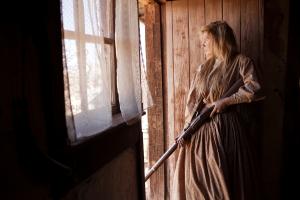By: debbie lynn elias

With a nod to Sergio Leone and Clint Eastwood, My #1 Must See Festival Film at the Los Angeles Film Festival 2012 celebrates a beloved genre of filmmaking, the American western – DEAD MAN’S BURDEN.
There’s nothing like some good old fashioned gunfire, family squabbles, horse riding, spurs, miners and homesteaders to get the juices flowing and that’s just what first time feature writer/director Jared Moshe does. Although the Civil War has ended, some folks are still divided in their thoughts on unification. One such family is the McCurrys.
Thanks to a tragic accident, family patriarch Joe is dead, leaving the homestead to his sole surviving heir, daughter Martha and her husband Heck. But it seems Martha isn’t the only heir. As if rising from the grave himself, brother Wade, long thought dead thanks to a difference of opinion on the North and South with his father (a headstone actual bears Wade’s name in the family cemetery), returns home after receiving a cryptic letter from his now deceased father. Saddened to learn both his parents and two brothers are dead, he is still overjoyed at seeing his Little Sunshine, sister Martha. Having travelled the west working as a sheriff and other odd jobs after fighting for the North in the war, Wade only wants to come home, settle down and be a farmer. But Martha and her husband have other ideas.
Martha has been talking to a mining company about selling the McCurry land. She wants $1000 so she and the husband can head west to San Francisco and open up a hotel. But that’s not what old Joe had in mind for his land and before his death he had repeatedly turned down all overtures for its sale. Suspecting that something isn’t quite right, Wade gets more suspicious after visiting his dad’s old poker buddy and best friend, Three Penny Hank, and discovers there’s more than meets the eye with Martha, Heck and the McCurry land.
With an eye for storytelling, Moshe knows his material and the manner in which the story is best told. With DEAD MAN’S BURDEN, that method is visual with calculated pacing. The cinematography is breathtaking – as I expected it would be given the location. Robert Hauer is masterful with his lighting and framing, lingering on panoramic vistas to create a metaphoric empty emotional vastness mirroring that of the individuals. Superb job of building tension with heat rising from the dry dust. If LAFF were to hand out a Best Cinematography Award, DEAD MAN’S BURDEN would be the frontrunner this year. Due to the minimal crew, Moshe ad company were able to shoot in the restricted area of the American Southwest known as the Painted Desert. Providing stunning panoramic vistas, we are treated to some of the most glorious and truly untouched natural area of the country. Maintaining a sensibility of pacing and editing that mimics that of Clint Eastwood’s “Unforgiven”, DEAD MAN’S BURDEN moves at a methodical, slow, calculated pace, much like the lifestyle of the era.
Character construction is solid and again, harkens to Eastwood and Sergio Leone. The story is actually interesting, going beyond textbook history, giving us the personal unemotional indifference of survival instinct and a mindset of “It had to be done” giving us insight into variations of lifestyle and purposes in life, all of which is refreshing to see and which the actors embrace with their performances.
A great ensemble cast, acting is rock solid. As Wade, Barlow Jacobs is a little rough around the edges in terms of nuance and at times has an uncertainty to his movements and persona, but it goes to the calculating uncertainty of the character. But talk about a surprise! Australian Clare Bowen just nails Martha complete with her gait, handling of a gun, the grit and grime. Emotionally brings a great obstinate and pragmatic survivalist tone to the character, something that she may have called on her own life experience for given her background as a cattle wrangler on a family range Down Under. As Heck, David Call is a man you love to hate and he is delicious at being bad but for the right reasons. No stranger to horses and handling of a gun, Call embodies the character and the era with a fluidity that is easy and believable. Personally, I am thrilled to see Joseph Lyle Taylor, Luce Rains and Richard Riehle in the cast. As mining executive EJ Lane, Taylor sets a great tone and calm that is emotionally and period perfect, while Luce Rains is unflappable in a brief appearance as Joe McCurry. And of course, you’ve got to love veteran actor (and particularly, veteran western actor) Richard Riehle as Three Penny Hank.
Rounding out the experience is a score by H. Scott Salinas that, although vacillates at times, is reminiscent of the tonal qualities of an Ennio Morriconi score in a Sergio Leone spaghetti western.
Wade – Barlow Jacobs
Martha – Clare Bowen
Heck – David Call
Three Penny Hank – Richard Riehle
E.J. Lane – Joseph Lyle Taylor
Joe – Luce Rains
Written and Directed by Jared Moshe.












